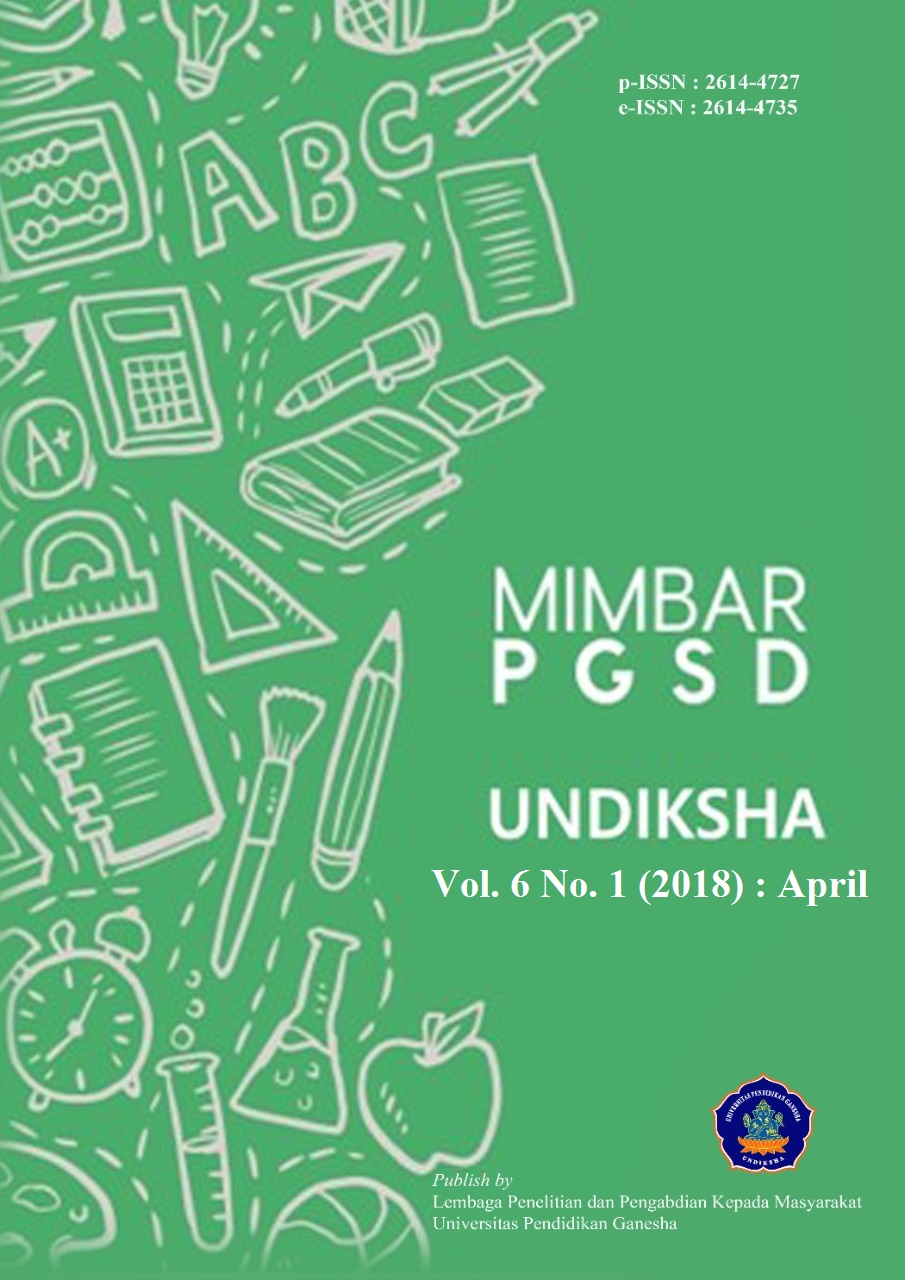PENGARUH MODEL PEMBELAJARAN PROBLEM BASED LEARNING (PBL) BERBANTUAN MEDIA QUESTION CARD TERHADAP HASIL BELAJAR IPS SISWA KELAS V SD
DOI:
https://doi.org/10.23887/jjpgsd.v6i1.13105Abstract
Penelitian ini bertujuan untuk mengetahui perbedaan yang signifikan hasil belajar IPS antara siswa yang dibelajarkan dengan model pembelajaran Problem Based Learning (PBL) berbantuan media question card dan siswa yang tidak dibelajarkan dengan model pembelajaran Problem Based Learning (PBL) berbantuan media question card di kelas V SD di Gugus III Kecamatan Melaya Kabupaten Jembrana tahun pelajaran 2016/2017. Jenis penelitian yang digunakan adalah penelitian eksperimen semu yang menggunakan desain non-equivalent posttest only control group design. Populasi penelitian ini berjumlah 170 orang. Sampel penelitian ini dipilih dengan teknik Simple Random Sampling. Sebanyak 23 orang siswa SD Negeri 2 Ekasari dilibatkan sebagai kelas eksperimen dan 20 orang siswa SD Negeri 2 Nusasari dilibatkan sebagai kelas kontrol. Data hasil belajar IPS dikumpulkan menggunakan instrumen tes berbentuk pilihan ganda. Data yang dikumpulkan dianalisis menggunakan analisis statistik deskriptif dan statistik inferensial (uji-t). Berdasarkan hasil analisis data, diperoleh thitung > ttabel (thitung = 3,58 > ttabel = 2,00) dan skor rata-rata siswa yang dibelajarkan dengan model pembelajaran Problem Based Learning (PBL) berbantuan media question card lebih tinggi yaitu 17,91, sedangkan skor rata-rata siswa yang tidak dibelajarkan dengan model pembelajaran Problem Based Learning (PBL) berbantuan media question card yaitu 13,75. Jadi, model pembelajaran Problem Based Learning (PBL) berbantuan media question card berpengaruh terhadap hasil belajar IPS siswa kelas V SD di Gugus III Kecamatan Melaya Kabupaten Jembrana tahun pelajaran 2016/2017.Kata Kunci : Problem Based Learning (PBL), question card, hasil belajar IPS
This research aimed at finding out the significant difference of Social Science learning outcomes between students who were taught with question card assisted Problem Based Learning Model (PBL) and students who were not taught by question card assisted Problem Based Learning Model (PBL) in Grade V of elementary schools in Cluster III, Melaya Sub district, Jembrana Regency, in the Academic Year 2016/2017. The type of research used was quasi experimental research using non-equivalent posttest only control group design. The population of this study amounted to 170 people. The sample of this research was chosen by Simple Random Sampling technique. That obtained 23 students of Elementary School 2 Ekasari involved as the experimental class and 20 students of SD Negeri 2 Nusasari involved as the control class. The Social Science learning outcomes data were collected using a multiple choice-shaped test instrument. The data collected were analyzed using descriptive and inferential statistical analysis (t-test). Based on the result of data analysis, it was obtained that tcount > ttable (tcount = 3.58 > ttable = 2.00) and the average score of students who were taught by question-card assisted Problem Based Learning Model (PBL) was higher, which was 17,91, while the average score of students who were not taught with question card assisted Problem Based Learning Model (PBL) was 13.75. Therefore, question card assisted Problem Based Learning (PBL) has an effect on the learning outcomes of Social Science students of Grade V of elementary schools in Cluster III of Melaya Sub district, Jembrana Regency, in the Academic Year 2016/2017.
keyword : Problem Based Learning (PBL), question card, Social Science learning outcomes
Published
2018-01-25
How to Cite
., N. P. E. A. A., ., D. I. N. M. M., & ., D. N. W. A. M. (2018). PENGARUH MODEL PEMBELAJARAN PROBLEM BASED LEARNING (PBL) BERBANTUAN MEDIA QUESTION CARD TERHADAP HASIL BELAJAR IPS SISWA KELAS V SD. MIMBAR PGSD Undiksha, 6(1). https://doi.org/10.23887/jjpgsd.v6i1.13105
Issue
Section
Articles
License
Authors who publish with the Mimbar PGSD Undiksha agree to the following terms:
- Authors retain copyright and grant the journal the right of first publication with the work simultaneously licensed under a Creative Commons Attribution License (CC BY-SA 4.0) that allows others to share the work with an acknowledgment of the work's authorship and initial publication in this journal.
- Authors are able to enter into separate, additional contractual arrangements for the non-exclusive distribution of the journal's published version of the work (e.g., post it to an institutional repository or publish it in a book), with an acknowledgment of its initial publication in this journal.
- Authors are permitted and encouraged to post their work online (e.g., in institutional repositories or on their website) prior to and during the submission process, as it can lead to productive exchanges, as well as earlier and greater citation of published work. (See The Effect of Open Access)













